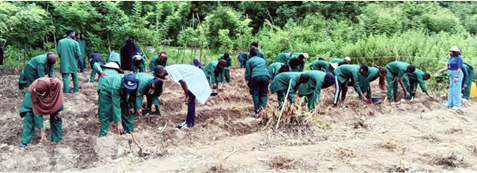By Mustafa Abubakar Eunice Ajayi and Eniola Abejide
A cross-section of 400 level students of the Department of Animal Production, Faculty of Agriculture, University of Ilorin, have described the ongoing Farm Practical Training (FPT) as a rare opportunity to bridge theoretical knowledge and practical experience.
The students, numbering in their hundreds, disclosed this last Tuesday (August 26, 2025) while sharing their experiences with UNILORIN Bulletin during the conclusion of their first two-week rotation.
Speaking on behalf of the Group, Miss Olalekan Azeezat Yetunde said that the exercise has been both fulfilling and rewarding.
She explained that the past two weeks involved pasture and forage cultivation, animal interaction, and exposure to different sections of the department, including poultry and ruminants.
Mrs Olalekan said, “It has been fulfilling and satisfying to finally put into practice what we had only studied in theory. We rotated through different sections, including poultry, turkeys, chickens, and ruminants. Though it was challenging, especially at the beginning when we struggled with water access, the Department has now provided a permanent irrigation source to support our work. We are grateful for the knowledge gained, and it has been a beautiful and rewarding experience.”
She also appreciated the Department of Animal Production, and the University management while also commending the lecturers, the farm manager, Dr Kamarudeen Kolawole Safiyu, the Head of Department, Prof. A. T. Yusuf, and other staff who made the experience practical and enriching.
Also speaking, the FPT Coordinator, Dr Safiyu, said that the farm practice programme is structured in modules across the Faculty of Agriculture, ensuring that every student rotates through all Departments.
He explained that for the Animal Production component, students were trained in ruminant and poultry management, while the swine unit was suspended due to technical challenges.
Dr Safiyu highlighted innovations introduced into the programme, particularly the establishment of a ranching model for ruminants.
According to him, the students cultivated one hectare of pasture, subdivided into three groups, where they planted elephant grass (Pennisetum purpureum), guinea grass (Panicum maximum), and intercropped with lablab (Lablab purpureus), a forage legume, and these crops have already begun sprouting.
“This training is meant not only to prepare our students for life after graduation but also to position the University as a contributor to national food security. By engaging students in forage production and ranching, we are teaching sustainable solutions to challenges such as the farmers/herders crisis, which is worsened by the scarcity of year round forage,” he said.
Dr Safiyu added that the programme for the 2025/2026 session involves 404 students and is divided into six components spanning the academic year. “The first three months, from August to October, are dedicated to school-based farm practice. The next three months, beginning in September, are for industrial training with external organisations. Upon returning in February, students will conmmence another three to four months of farm practice, including advanced training”, he added.
Dr Safiyu explained that subsequent sessions will introduce students to silage and hay production for forage conservation, as well as broiler and layer poultry production.
He said that it will ensure that every graduate is well-grounded in livestock management and feed production techniques.
“At the end of this training, our students will know how to handle cattle, sheep, goats, and poultry. Beyond animal management, they will also understand how to grow and conserve the feed required for these animals throughout the year. This guarantees that UNILORIN graduates will be well equipped, globally relevant, and proud ambassadors of the University,” he said.
The Head of the Department, Prof. Eunice Shola-Ojo, said that the news of the students’ impressive performance has already spread, showcasing the dedication and innovation of the FPT 2025/2026 set.
She added that the Department would continue to improve on the practical training to ensure students graduate with the competence required to contribute meaningfully to the agricultural sector.

